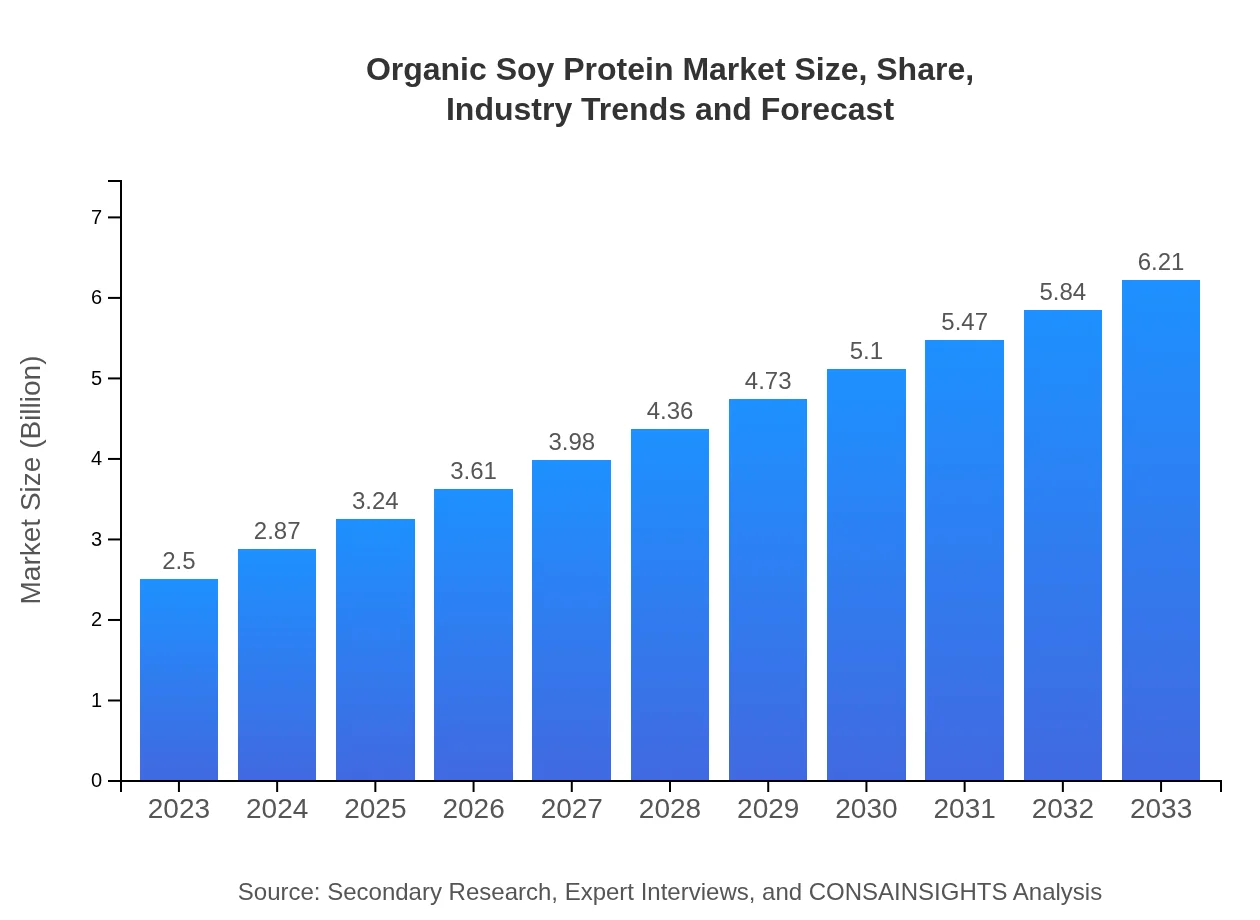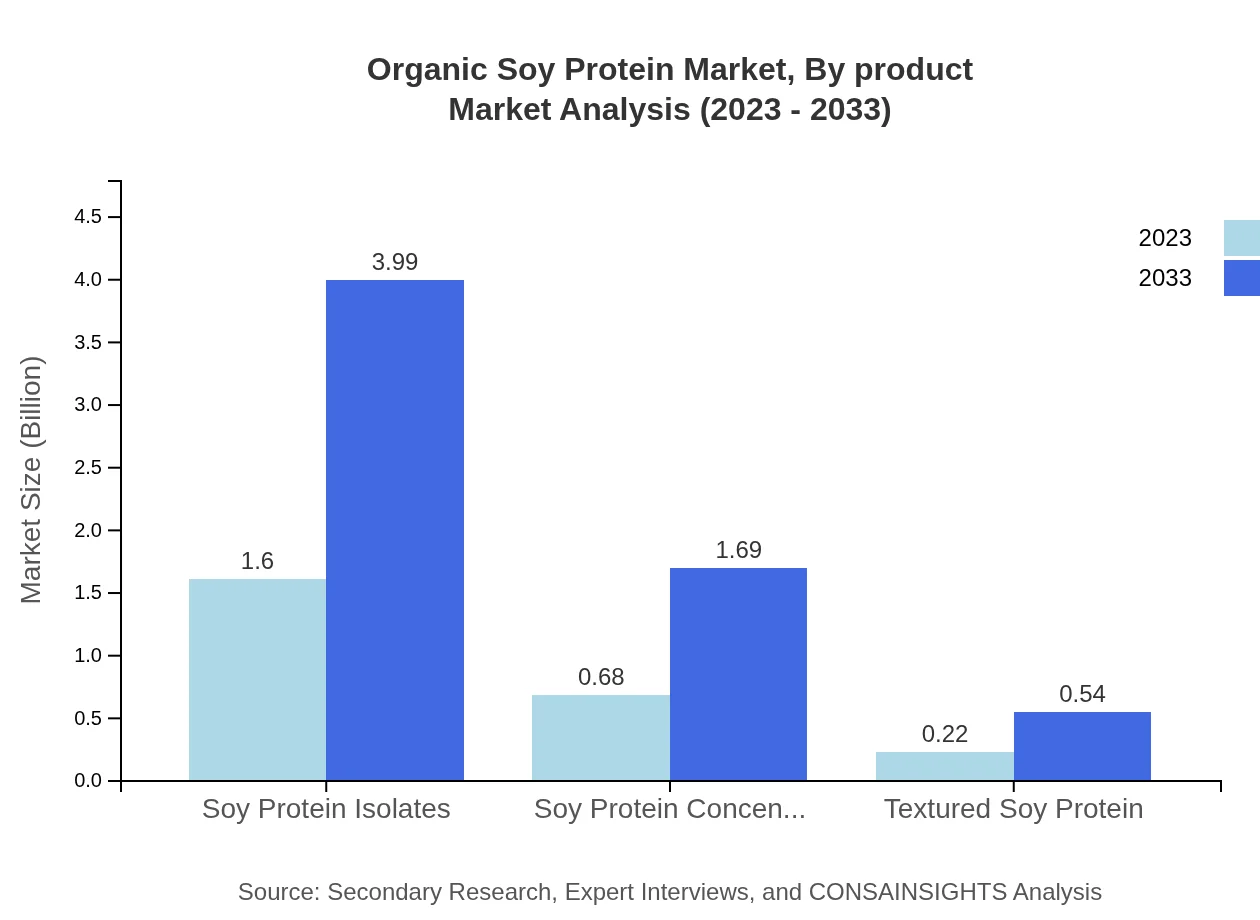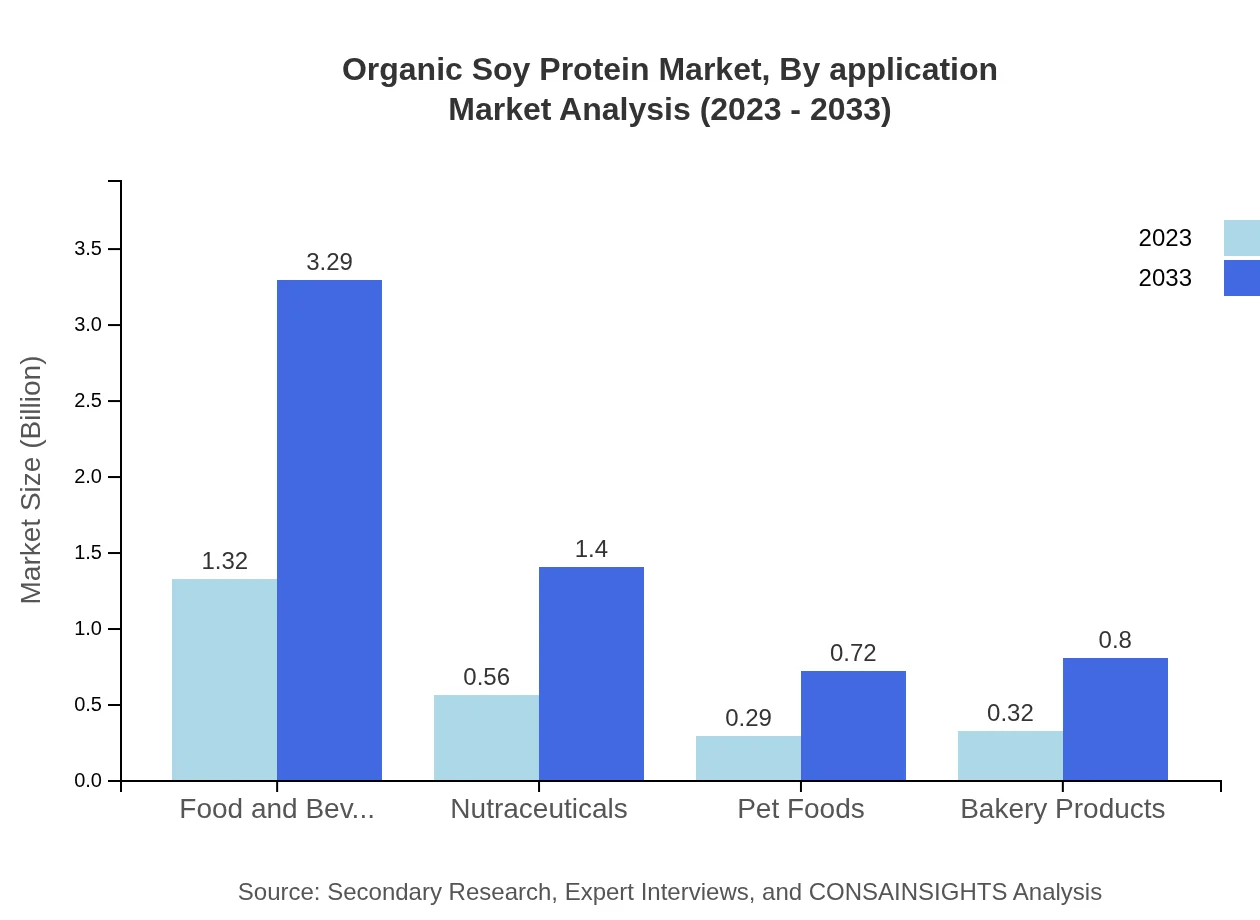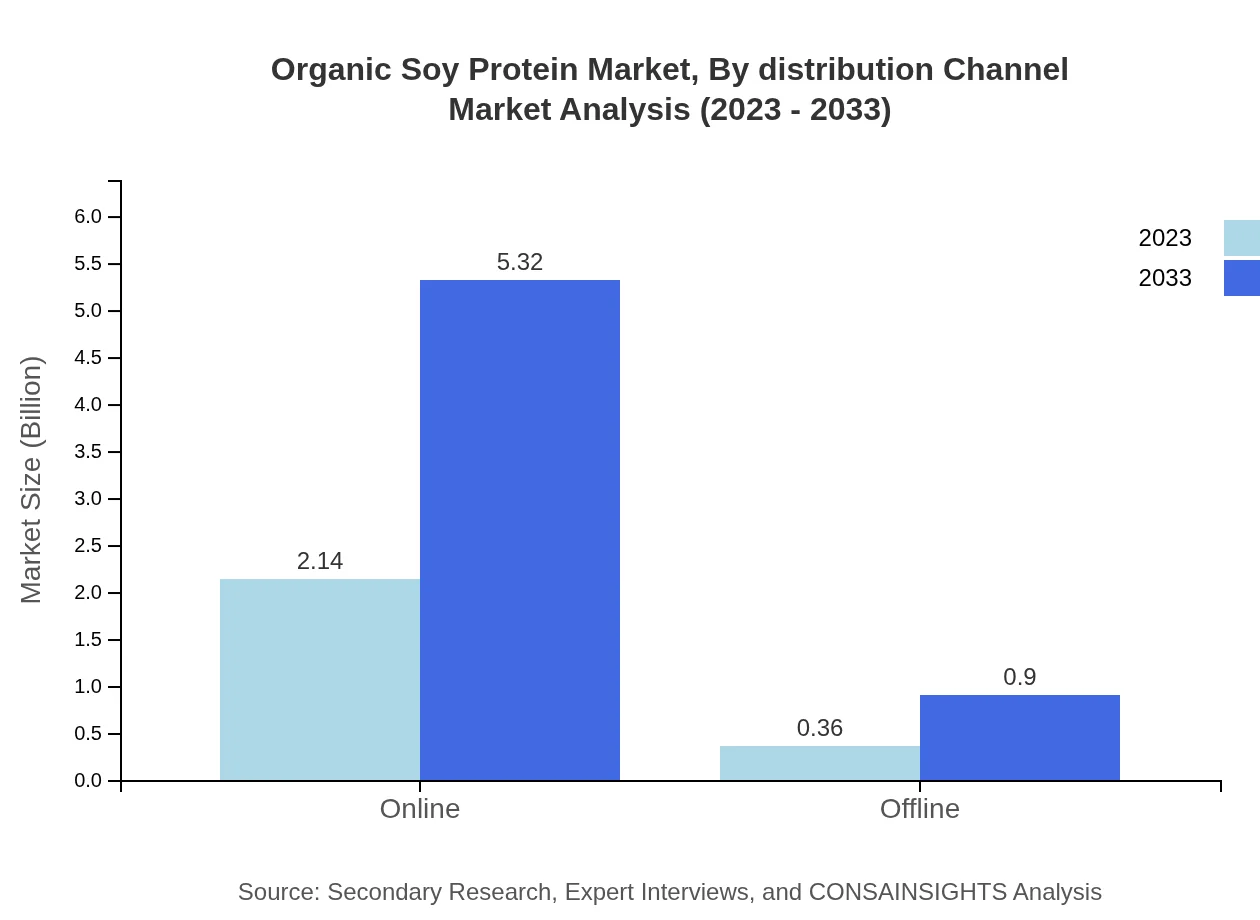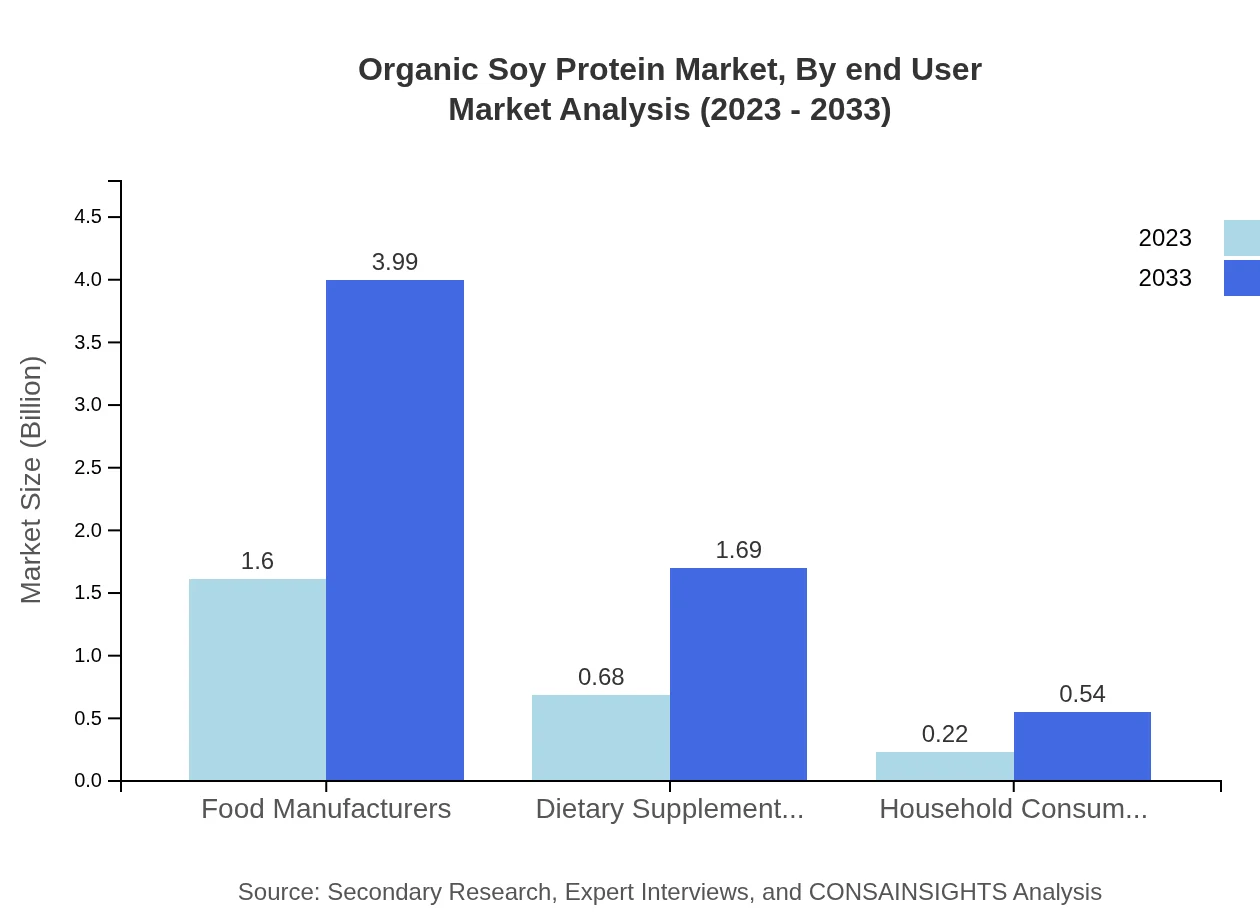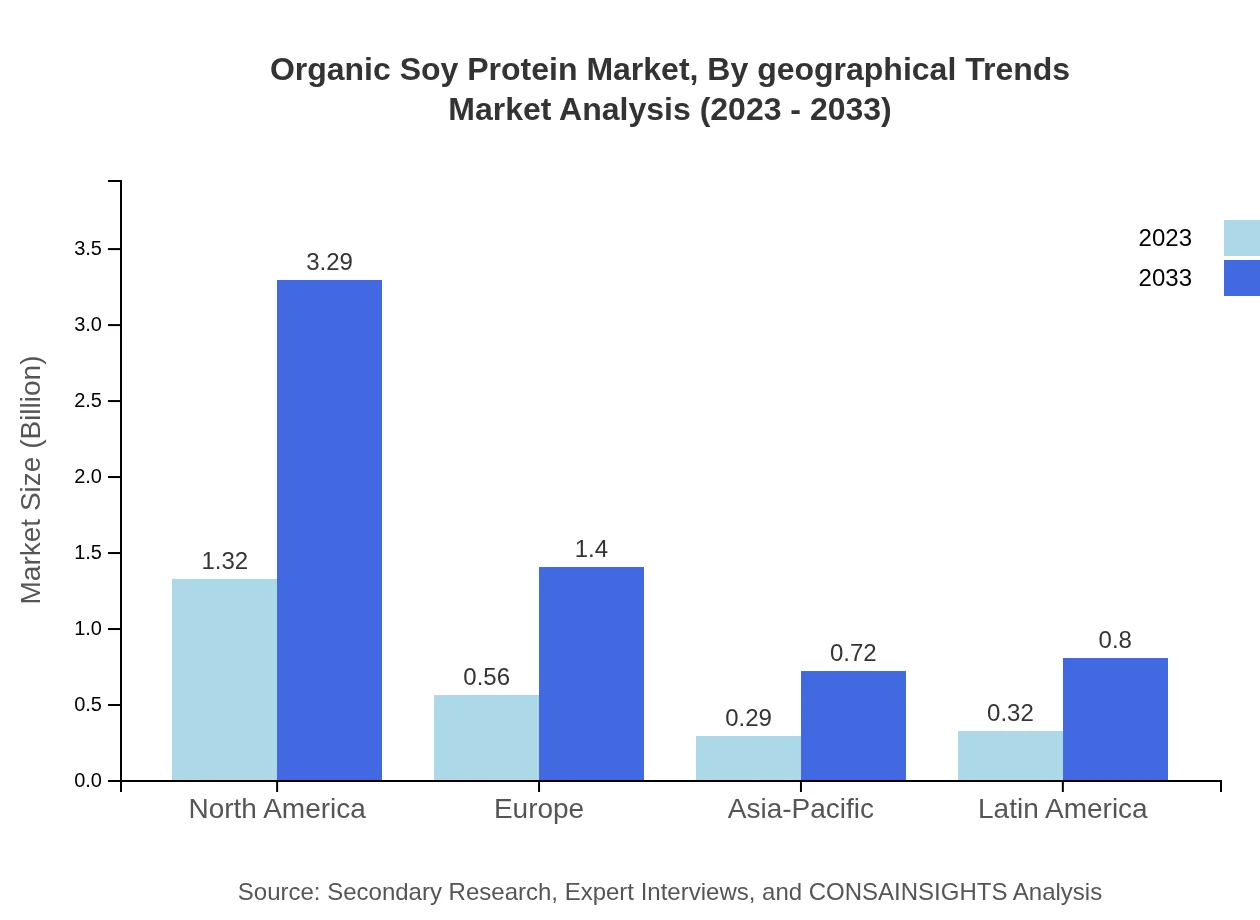Organic Soy Protein Market Report
Published Date: 31 January 2026 | Report Code: organic-soy-protein
Organic Soy Protein Market Size, Share, Industry Trends and Forecast to 2033
This report provides a comprehensive analysis of the Organic Soy Protein market, including market size, growth projections, industry analysis, and trends from 2023 to 2033. It explores regional insights, market segmentation, key players, and future forecasts based on current market dynamics.
| Metric | Value |
|---|---|
| Study Period | 2023 - 2033 |
| 2023 Market Size | $2.50 Billion |
| CAGR (2023-2033) | 9.2% |
| 2033 Market Size | $6.21 Billion |
| Top Companies | DuPont de Nemours, Inc., ADM (Archer Daniels Midland Company), Cargill Incorporated, SOYPRO S.A., Givaudan SA |
| Last Modified Date | 31 January 2026 |
Organic Soy Protein Market Overview
Customize Organic Soy Protein Market Report market research report
- ✔ Get in-depth analysis of Organic Soy Protein market size, growth, and forecasts.
- ✔ Understand Organic Soy Protein's regional dynamics and industry-specific trends.
- ✔ Identify potential applications, end-user demand, and growth segments in Organic Soy Protein
What is the Market Size & CAGR of Organic Soy Protein market in 2023?
Organic Soy Protein Industry Analysis
Organic Soy Protein Market Segmentation and Scope
Tell us your focus area and get a customized research report.
Organic Soy Protein Market Analysis Report by Region
Europe Organic Soy Protein Market Report:
Europe shows a promising market transition, growing from $0.61 billion in 2023 to $1.51 billion by 2033, due to heightened awareness regarding health and sustainability. The European market is characterized by a strong regulatory framework supporting organic agriculture, fueling demand for organic soy protein products in food, beverage, and nutraceutical applications.Asia Pacific Organic Soy Protein Market Report:
In the Asia-Pacific region, the organic soy protein market is forecasted to grow from $0.50 billion in 2023 to $1.24 billion by 2033, reflecting a robust annual growth rate as a result of rising health consciousness among consumers and a growing vegan population. Countries like China and India are witnessing increased investment in plant-based protein alternatives, bolstered by government initiatives to promote sustainable agriculture.North America Organic Soy Protein Market Report:
North America's organic soy protein market, currently valued at $0.95 billion in 2023, is expected to reach $2.36 billion by 2033. The surge in demand for dairy alternatives coupled with ongoing innovation in food formulations significantly contributes to this growth, particularly in the United States, where consumer trends greatly favor plant-based proteins.South America Organic Soy Protein Market Report:
South America is anticipated to increase its market share from $0.23 billion in 2023 to $0.56 billion by 2033. The growth is facilitated by the increasing consumption of organic products fueled by health-driven consumer behavior and the rising production of organic soybeans, particularly in Brazil and Argentina.Middle East & Africa Organic Soy Protein Market Report:
The Middle East and Africa market is projected to grow from $0.22 billion in 2023 to $0.54 billion by 2033, driven by a gradual shift towards plant-based diets and health-focused consumer patterns. However, the region faces challenges in organic product availability and market penetration, necessitating improved supply chains.Tell us your focus area and get a customized research report.
Organic Soy Protein Market Analysis By Product
Soy Protein Isolates dominate the organic soy protein market, expected to grow from $1.60 billion in 2023 to $3.99 billion by 2033, maintaining a market share of 64.18%. Soy Protein Concentrates follow, with a size of $0.68 billion in 2023, increasing to $1.69 billion by 2033 (27.2% share). Textured Soy Protein is also relevant, projected to develop from $0.22 billion in 2023 to $0.54 billion by 2033, retaining 8.62% market share.
Organic Soy Protein Market Analysis By Application
The Food and Beverage sector represents a significant portion of the organic soy protein market, expected to grow from $1.32 billion in 2023 to $3.29 billion by 2033 (52.97% share). The Nutraceuticals segment follows, with a rise from $0.56 billion in 2023 to $1.40 billion by 2033, marking a 22.56% share. Other applications include Bakery Products and Pet Foods, which grow steadily over the forecast period.
Organic Soy Protein Market Analysis By Distribution Channel
The online sales segment currently dominates the distribution channels for organic soy protein, with a defined value of $2.14 billion in 2023, expected to rise to $5.32 billion by 2033, constituting 85.57% market share due to the increasing trend in e-commerce shopping. Meanwhile, offline sales are projected to expand from $0.36 billion in 2023 to $0.90 billion by 2033.
Organic Soy Protein Market Analysis By End User
Food Manufacturers are the key end-users of organic soy protein, valued at $1.60 billion in 2023 and expected to reach $3.99 billion by 2033, retaining a share of 64.18%. Dietary Supplement Companies show promising growth, moving from $0.68 billion in 2023 to $1.69 billion by 2033, making up 27.2% market share, while Household Consumers showcase gradual uptake, growing from $0.22 billion to $0.54 billion over the same period.
Organic Soy Protein Market Analysis By Geographical Trends
Geographically, North America leads the organic soy protein market, forming approximately 52.97% of the market in 2023, progressing to considerable growth driven by increasing vegetarian, vegan, and flexitarian diets. Europe and Asia-Pacific region closely follow, driven by regional health trends and substantial investments into organic food production.
Organic Soy Protein Market Trends and Future Forecast
Tell us your focus area and get a customized research report.
Global Market Leaders and Top Companies in Organic Soy Protein Industry
DuPont de Nemours, Inc.:
A leading innovation-driven company in the sector of food ingredients, DuPont provides high-quality soy protein products, contributing substantially to the market through robust research and sustainable sourcing practices.ADM (Archer Daniels Midland Company):
ADM is a major player offering a diverse range of soy protein products, leveraging their vast distribution network and processing capabilities to enhance market availability and accessibility.Cargill Incorporated:
Cargill is prominent in the organic soy protein market, focusing on innovation and sustainable agriculture, helping to trailblaze the movement towards healthier food options globally.SOYPRO S.A.:
SOYPRO specializes in organic soy protein production, gaining recognition for their commitment to sustainability and eco-friendly practices while serving a diverse international clientele.Givaudan SA:
Givaudan, known for flavor and fragrance creation, also produces various plant-based proteins that support the growing demand for healthy, vegan-friendly products, significantly impacting the market.We're grateful to work with incredible clients.









FAQs
What is the market size of organic soy protein?
The organic soy protein market is projected to grow from a size of approximately $2.5 billion in 2023 to an impressive size by 2033. This growth reflects a compound annual growth rate (CAGR) of 9.2%, signifying robust demand for organic protein sources.
What are the key market players or companies in the organic soy protein industry?
Key players in the organic soy protein market include major food manufacturers and dietary supplement companies who dominate market shares, with food manufacturers representing 64.18% and dietary supplement companies accounting for 27.2% of the total market share, respectively.
What are the primary factors driving the growth in the organic soy protein industry?
Increased health awareness, the rising trend of plant-based diets, and the growing necessity for protein alternatives are major driving factors. Consumers are increasingly seeking organic and sustainable food sources, boosting demand for organic soy protein significantly.
Which region is the fastest Growing in the organic soy protein market?
North America is the fastest-growing region for organic soy protein, projected to escalate from $0.95 billion in 2023 to $2.36 billion by 2033. Europe and Asia-Pacific also show substantial growth, reflecting increasing consumer demand across these regions.
Does ConsaInsights provide customized market report data for the organic soy protein industry?
Yes, ConsaInsights offers customized market report data tailored to specific needs. Companies can request insights to suit their market strategies, enabling them to capitalize on specific growth opportunities within the organic soy protein sector.
What deliverables can I expect from this organic soy protein market research project?
Expect comprehensive deliverables including detailed market analyses, growth forecasts, competitive landscape insights, segmentations by type and region, and consumer behavior trends tailored for the organic soy protein market.
What are the market trends of organic soy protein?
Emerging trends in the organic soy protein market include a shift towards online purchasing platforms, increased engagement in sustainability practices, and a greater emphasis on health-conscious products. These trends illustrate the evolving consumer landscape in food choices.

